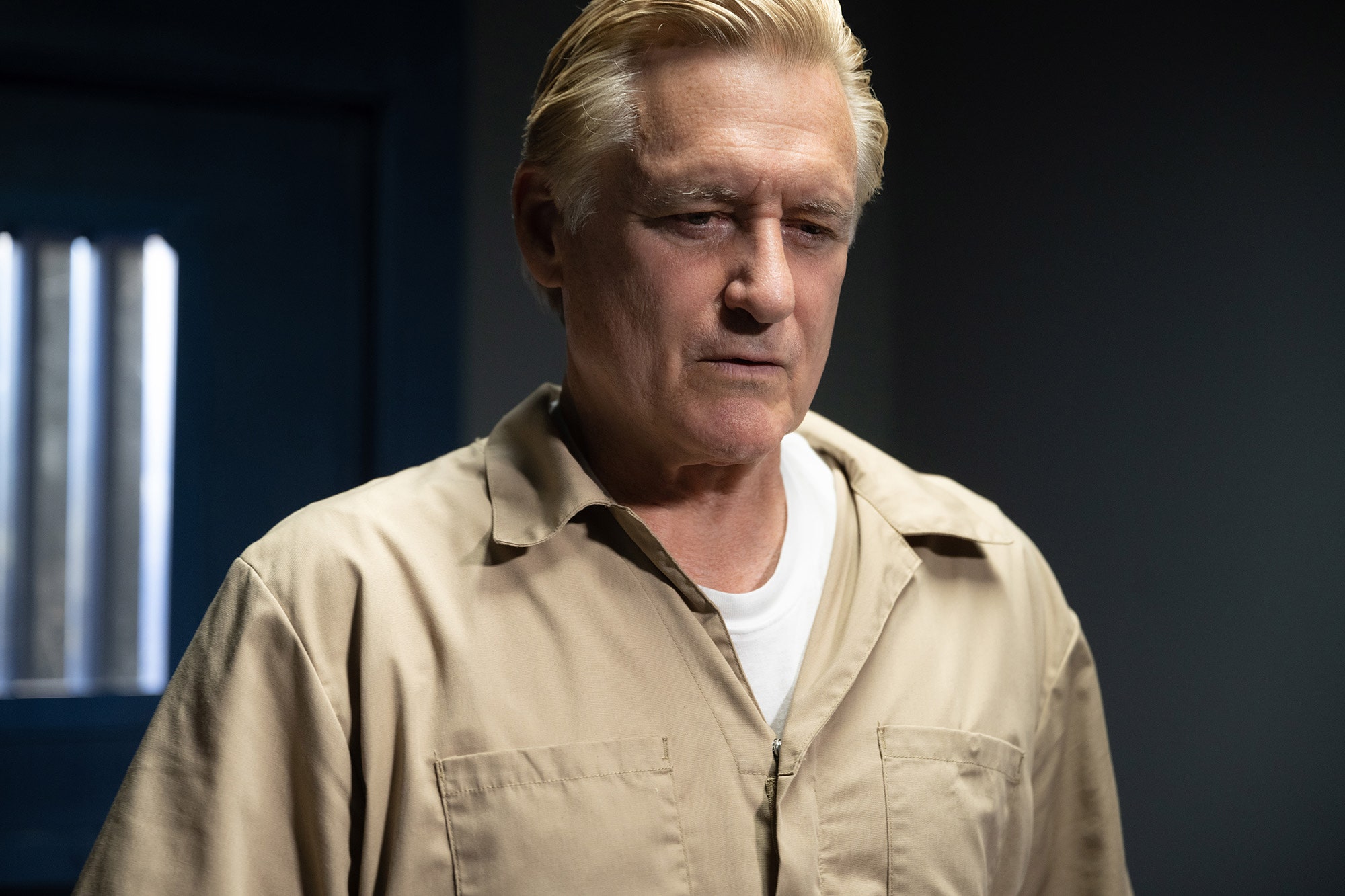Bill Pullman Finds Freedom in Portraying Alex Murdaugh in Vanity Fair

Article by Julie Miller
Although most Americans were aware of Alex Murdaugh, a disgraced South Carolina attorney convicted for murdering his wife and son, actor Bill Pullman was not. As Pullman admits, he often disregards reports of ghastly murders. Prior to reading a script for a Lifetime movie about Murdaugh, he was oblivious to the case.
Pullman, endearing and slightly disoriented with modern technology, speaks over a Zoom call. According to GQ, he's like a history teacher out of his comfort zone in the digital age. On the call, Pullman initially has his microphone on mute and unintentionally leaves a picture frame, hastily removed to clear the background of his Beachwood Canyon house, visible on the bed.
Pullman also spends time at a ranch he co-owns with his brother in Whitehall, Montana, a town of barely 1,000 people. It wasn't until talks with locals at a farm supply store that he realized his unfamiliarity with the Murdaugh case.
If Pullman had been following the news and trial, taking on the role of Murdaugh might have seemed overwhelming. Despite the seeming openness of today's digital era, Pullman remarks that the complete truth about individuals remains undisclosed, making it intriguing to portray the "exposed" character of Murdaugh.
Pullman finds interest in Murdaugh's complex history of deceit, eventually uncovered during a court judgment. The decision to cast him, well-known for his roles in Independence Day, While You Were Sleeping, and Casper, as a family murderer also took people by surprise.
The peculiarities of Pullman’s participation in the film increased after he accepted the part. He was allowed only ten days to familiarise himself with the details of Murdaugh's crime saga due to a SAG-AFTRA strike threatening to delay production. Pullman immersed himself in the case by studying tapes, modifying his appearance and practicing the character's distinct dialect.
Pullman’s portrayal of the threadbare fellow captures the Lowcountry accent and presents an engaging interpretation of Murdaugh’s peculiar habits. The actor further observed the significant shift in Murdaugh's demeanor and physicality in the courtroom, compared to his condition during the traumatic night of the murders. He discusses how Murdaugh transitioned from being distressed and panicky during his 911 call to appearing calmer and even cooperative with the police.
Pullman is from rural New York and spends a lot of time in desolate Montana. “In rural areas, there’s a little bit more humility, and sometimes it’s demonstrative humility that is kind of like a put-on thing. Sometimes it’s genuine, but [you’re] much more likely to see somebody with affectations in those areas,” says Pullman. “I love the South for that.”
There’s one detail that Pullman wishes he’d had time to work into his performance: the way Murdaugh, on the evening of the murders, kept interrupting dramatic questioning by police officers to open a car door and spit chew. “In Montana, we call it snus—fine-cut tobacco you put behind your lip,” Pullman tells me. “[Murdaugh] was very discreet about it, but in one of the dashcam recordings, when he’s sitting in the passenger seat up front, a couple times he opened the door, leaned out, and then came back in…. I realized that he was dipping.”
Pullman loves this kind of behavioral anomaly. “Having that buildup of spit and then [making] the decision, in the middle of being traumatized and everything, [to lean out and spit]—that would’ve been great.”
Most humans are saddled with emotions like guilt and anxiety, but to play Murdaugh, Pullman turned off valves for those feelings. “Hearing things and not letting them cause anxiety, it’s kind of freeing,” says Pullman, explaining that it seemed like Murdaugh’s cycles of addiction and lying were interlinked. “When you are feeling like that monster of doom and gloom is starting to sneak toward you…to be relieved from that and to [have] an invincible power of talk where you do the high-wire act and whatever you need to say is going to occur to you in the moment because you’re so on top of it—that thing about an addiction is kind of wonderful.”
Speaking about how Murdaugh escalated his drug use to make up for his increased tolerance, Pullman explains, “You are trying to stay on top of a moving wave. You’re just willing to do whatever it takes to stay on top of it.”
Some people might scoff at an actor like Pullman doing a Lifetime movie. After all, he’s done a David Mamet play on Broadway (Oleanna); been directed by David Lynch (Lost Highway); been nominated for a SAG Award by his peers (The Sinner); costarred in a Tony-winning play (The Goat, or Who Is Sylvia?); and delivered a presidential speech onscreen that some might argue is better than ones given by real-life presidents.
But Pullman seems thrilled to have been on a film set where “people are excited about what you’re doing.” Making the Lifetime movie, especially after the isolation of COVID, was a nice reset, he explains. “There was a great young crew…. They weren’t jaded at all.”
Despite his extensive filmography, Pullman doesn’t have any airs about him. In fact, when the actors strike took effect, he literally pulled up his sleeves and got to work on the ranch.
“You know what a jackleg fence is?” he asks—an exceedingly polite query considering I clearly don’t know what a jackleg fence is. “It’s a little more expensive than barbed wire, but you use it in places where there’s a lot of push. I have a bull pasture where the bulls get in there, and then in springtime particularly, they pushed that fence. So I went up and made the jackleg fence for it, which took a week. And some it was during rain.”




